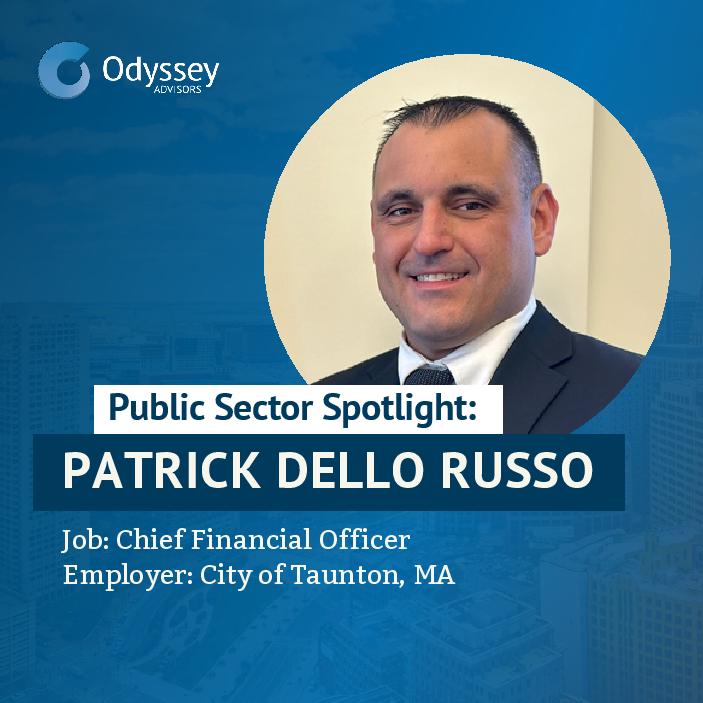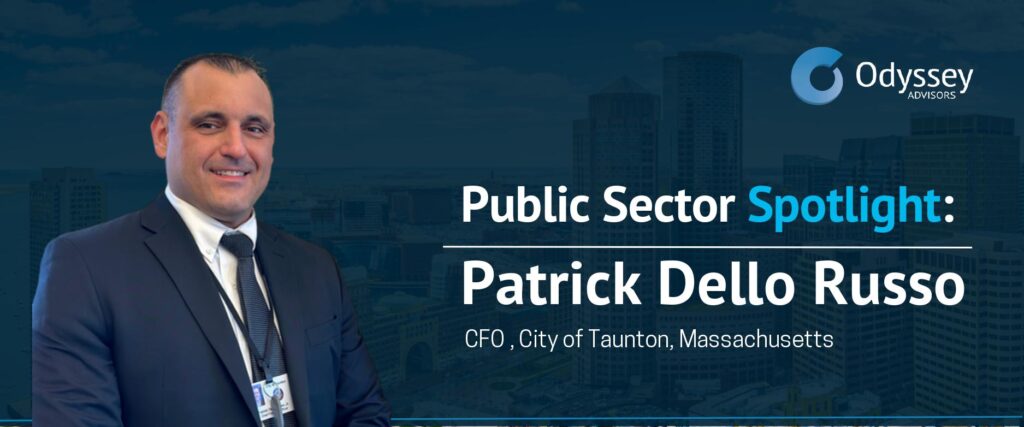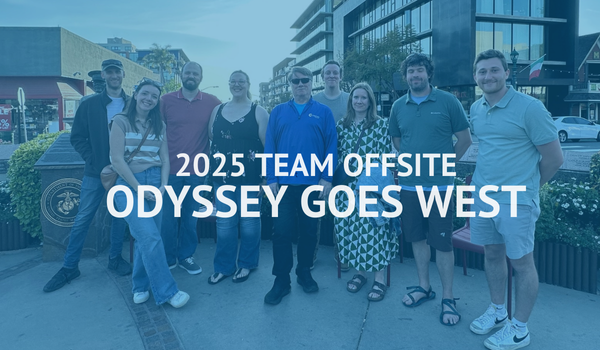Spotlighting Careers in the Public Sector: Patrick Dello Russo
March 8, 2023|Stephanie Irvin

Meet the public sector talent that makes it all work
Public sector careers tend to take a backseat to their Private Sector counterparts, but not in this series. We’re aiming the spotlight on our public sector partners and the incredible impact they have on our communities and society. From emergency service and healthcare to education and finance, the span of careers in the public sector is diverse.
This month we’re excited to turn the spotlight on Patrick Dello Russo, CFO for the City of Taunton.
A Little Bit About Patrick
Meet Patrick Dello Russo. Appointed as the City of Taunton, Massachusetts’ first CFO in 2021, Patrick has a lengthy track record in municipal finance serving four different types of local governments. He has a vast range of experience in multiple capacities over the span of his career in the public sector.
Patrick is a married father with four daughters. He fell in love with municipal finance and government after watching his father serve as CFO of the Town of Plymouth for 13 years. He has a proven track record of success in each community he’s served, most recently in his current position, where he and his finance team successfully achieved increasing the city’s bond ratings in September of 2022.
Career Story Interview
Q: How did you get started in the municipal finance industry?
A: So I am the Chief Financial Officer for the City of Taunton, the first CFO in the city’s history. The city passed an ordinance in 2021 establishing the position and its responsibilities. I was hired in November of 2021 to fulfill the role and to formulate the finance department. I have worked in 5 municipalities. I grew up in this industry. My father is the CFO at the City of Melrose and was the CFO for the Town of Plymouth. I grew up watching this stuff on local access television and seeing how things get done since I was a little kid. It’s really rewarding to be able to do the same thing as my old man.
For college, I went to Suffolk University and graduated with a degree in finance. From there I started as what I would call an entry-level accountant at Powers & Sullivan doing various municipal audits. From there, I took my talents to the Town of Wellesley, followed by the Town of Hamilton as Assistant Treasurer. Then I became the Acting Treasurer/Collector for the City of Haverhill. From there I became the Director of Finance for the Town of Marshfield at the age of 29. I did that for 5 years before I made my way to the highest point (from Director to CFO of the City of Taunton) at age 35.
I’ve been doing this for 15 years, and 9 of those 15 years have been in a leadership capacity. Working for Mayor O’Connell has, by far, been the best experience. She’s put together a great team and under her stewardship, the city has never been in a better position. I’m glad to be part of her team.
Q: Tell us more about your department and how it works
A: Sure, so I oversee all municipal finance activities for the city and work directly in the Mayor’s office. I have 5 direct reports which include the Office of the Budget, Office of Auditing, and Office of the Treasurer-Collector. I also oversee purchasing and procurement as well as the Assessor’s Office. I formulated a finance team consisting of my direct reports but also the IT divisions, our DPW, as well as the Office of Economic Development. We work in tandem to ensure the best idea wins the day. One of my responsibilities is to create the type of environment which allows for the free flow of ideas amongst our team.
Any financial-related activity has to come across my desk, so about 75% of all activity in the city, I have my eyes on. There’s really not a standard day because most of my day consists of meetings with various stakeholders, whether it be our departments, people looking to do business with the city, or construction and construction and capital related.
Shortly after I arrived, we implemented the city’s first-ever capital improvement plan (more commonly referred to as a capital budget). We’ve been able to infuse over $23 million into infrastructure, with roads, sidewalks, pipe drains, vehicle replacements, and upgrades in Memorial Park, there is a very lengthy listing on our website which I encourage folks to check out. So that’s been a very large component of my day to do – project tracking, receiving project updates, orchestrating team meetings, and all of those things.
Q: What would you tell others who want to start a career in public finance?
A: You have to understand the objectives and goals of your appointing authority. If you’re in a leadership role, the number one goal is to advance the Mayor’s initiatives and be able to provide guidance to the Mayor and/or Board of Selectmen. Because they have a lot of ideas and need to know how to plan for them. If you can plan for it, you can pay for it.
That’s something that I think goes by the wayside. Often, many folks think, “that number’s too big. We could never do that.” But they need to instead think, “why is this number so big?” Looking at projects for instance, can things be done in a phased approach?
Another component is getting a performance-based budget which removes ebbs and flows. In municipal finance, it’s all about consistency. For example, taxes are going to go up by 2.5% each year. Local receipts are always going to go up by 2 or 3%. Those things are always going to happen. So you have to make an expenditure plan based on facts so we can advance the Mayor’s goals.
And the second thing you need is to make sure all of your contractual obligations are satisfied first. The best way to do that is by sticking with a needs-based budget. You need to take care of the contractual component of your budget first and then take care of what the Mayor wants to see done.
Often, many folks think, “That number’s too big. We could never do that.” But they need to instead think, “Why is this number so big?”
Patrick Dello Russo, CFO CIty of Taunton
Q: Are there any industry-specific communities or events you would recommend to someone in the field?
A: Oh, absolutely. I was actually the Vice Chairman of the Small Government Forum for the GFOA. I think that everyone in a sort of department director position, whether that be a treasurer, an auditor, or any procurement office should get involved. Networking is so crucial and I think it’s undervalued.
Here’s why I think networking is undervalued – you need to be able to approach things as “the best idea wins the day” instead of the typical guns-blazing approach (I’m a big victim of doing this earlier in my career). When I first started out, I would come in with all these ideas and want mine to be the best, but that’s not the way to go about doing it. The best way to do it is, to go with the best idea wins. And how do you find those? Finding people outside of your bubble to bounce ideas with.
So I recommend joining the GFOA. The New England States GFOA if you’re in New England. The GFOA is really where it’s at. It opens your eyes up to doing things differently. If you want to be successful, you have to think outside the box.
This is also a great way to keep adding value to your boss. Many are hesitant about working in the public sector field because they think they are going to max out how far they can go. But that’s not the case. If you keep adding value and bringing new ideas to the table and putting the community in a better position – you won’t max out. That’s the goal because it’s all about the community. If you can improve things – like getting a bond rating increase, increasing your free cash number, etc. then you can have a real lasting impact.

Q: What advice would you give to someone who wants to become a municipal finance director or CFO?
A: My situation is kind of unique because I already knew what it took to get to this position by growing up around it. So I had to basically build up a resume that says, ‘this guy checks the boxes.’ So my advice would be that you need to go down one of two paths – become an auditor/town accountant or treasurer-collector, depending upon the city. You have to position yourself to be in one of those two roles.
And you should do that for at least three years in order to take the jump. And why do you have to do that? Because you have to be able to understand at least one side of the budget.
Budgets aren’t just expenses, budgets are also revenues. I went down the treasurer’s side. If you understand how you make the money and what you can anticipate with the money – that’s 50% of the budget process. It’s understanding your revenues.
Similarly, if you go down the city auditor or town accountant path, you understand the expense side of things. You understand how much you’re spending and what’s going out.
So in order to be given the opportunity to move up it’s all about your comprehension of what keeps the whole city or town’s operations moving. Therefore, it’s crucial to have one of those two paths nailed down which takes time. I think three years is the minimum to be successful, but if you want to have it mastered, you need to have about seven years.
And I may be biased, but coming from the treasurer-collector side of things, you have a better advantage because you understand health insurance, debt service, and pension plans. These three expenditures are what we call fixed costs. So having an understanding of fixed cost and revenue gives you a leg up, I think, as opposed to an auditor or an accountant who looks at things in the past versus the future.
So that’s my piece of advice for folks that are coming into the field. Pick a lane and stick with it. Then just go for it.
Q: What are some future trends or challenges you anticipate in municipal finance?
A: The slowdown of the housing market. Right now many communities are thriving because they’ve had consistent growth. This growth has been spurred over the past 14 years as we’ve seen growth in the economy. That’s good for municipalities.
It’s also good because when interest rates were lower, people were doing a lot more remodeling. And when you remodel homes, what happens is you get permits, right? So municipalities were direct benefactors because of the increase in permit fees, which ultimately falls to free cash at the end of the year. When you do your certification process with the Department of Revenue, what that free cash does is allow you to invest in projects. It allows you to invest in roads, new buildings, new additions, the library, improve the conditions of interior spaces, etc.
So what’s going to happen when that stops?
And the other component is that folks have to understand that all the ARPA money that was flooded into the city’s coffers and town’s coffers isn’t going to last forever. What scares me is that some communities probably have done that because they’re so accustomed to having a cash register, for lack of a better term, from the federal government.
So communities may have these ideas that they’re going to be able to keep operating like this or have portrayed that to their community members, voters, or their leadership. This isn’t anything new though. This is always going to happen. It’s a major problem.
I think that something that is going to be a big challenge is when the Feds stop printing money and when the interest rates are so high, what happens to the home improvements and improvements to downtown district areas when that all goes away?
Another challenge we will be facing in the Commonwealth is net school spending requirements dictated to us by DESE. These amounts of funding to our school systems really place a budgetary drain on municipal budgets that frankly are unsustainable. For instance, we are required to provide 10% increases year over year for the schools, which means reductions to city-side expenditures to meet the mandate. For our city, that means $10.3 million this coming fiscal year, and this is on top of the $9.8 million increase for the current fiscal year we are in.
Rapid Fire Questions for Fun
Q: We know Massachusetts loves its Dunkin’ Donuts. Do you have a go-to order?
A: Hazelnut black, one Splenda, iced.
Q: Do you have a favorite small business in Taunton?
A: Probably one of our local restaurants. I like the Liberty & Union across the street. That’s always a go-to place to get a great meal. And actually one of our City Councilors, Chris Coute, actually owns the restaurant too.
Q: If you could do another job for a day within Taunton, what would it be?
A: Honestly, this is it for me. I love what I do!
If you want to learn more about Patrick or his job, you can contact us here with your contact information, and we’ll get the message to him on your behalf.
More on careers in the public sector:
Kate Fitzpatrick: Town Manager, Town of Needham, MA
Leon A. Gaumond Jr: Town Manager, Weston, MA
Categories: Community

About The Author Stephanie joined the Odyssey Advisor’s team all the way from the Lonestar state in November of 2020. She is versatile in her abilities and has experience in copywriting, photography, and analytics. She helps tell our brand story and convey...
More Insights From This author

September 2, 2025
Stephanie Irvin

October 15, 2024
Stephanie Irvin

November 29, 2023
Stephanie Irvin

November 15, 2023
Stephanie Irvin





